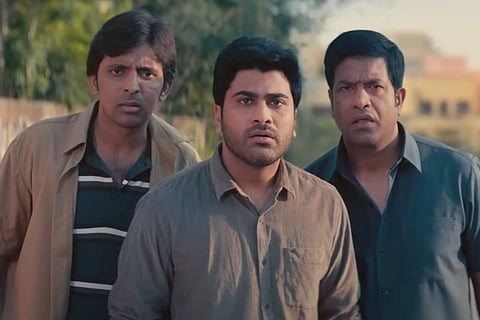

Time travel films are often complex and it requires a certain amount of courage and skill to attempt the genre, as it runs the risk of oversimplification or overcomplication. Taking up this mighty challenge, writer and director Shree Karthick has delivered Oke Oka Jeevitham. The film stars actors Sharwanand, Ritu Varma, Amala Akkineni, Vennela Kishore, Priyadarshi and Nasser in prominent roles.
Though Oke Oka Jeevitham is a time-travel film, it steers clear of the science – it does not focus on the theories of time-travel, or invest any time in explaining quantum physics or the concepts of time and space. Rather, it is a film about human emotions. And this is where Oke Oka Jeevitham becomes a fun film to watch.
Aadhi (Sharwa), a musician, is struggling to establish his career. His stage fear and social anxiety are hurdles in his promising career. He has not been able to outgrow the fears he’s faced since childhood, just like he has not outgrown the friendship of Chaitu (Priyadarshi) and Srinu (Vennela Kishore), his childhood friends. A strange coincidence? In Shree Karthick’s world of coincidences, all three friends are unhappy with their present, sad lives, and they are presented with an opportunity to go back to the past and hopefully change the course of their lives. Thus begins the adventure.
Shree Karthick greatly exploits the nostalgia of the ‘90s by showcasing the iconic TV advertisements, radio jingles, and vehicles from that era. While he easily convinces us that the story is taking place in 1998, the repetition of archival footage does make it jarring after a point.
Oke Oka Jeevitham would have turned out to be a remarkable film in the sci-fi time-travel genre in the Telugu film industry, joining the likes of Aditya 369, had the writer-director focussed on the script. In fact, it has a stunning twist before concluding the first half, but the writing gets weak in the second half.
For instance, Aadhi, Chaitu and Srinu immediately deduce that their younger selves have done some mischief and ruined their plan of time-travel. Followed by this, there is no explanation of how Chaitu and Srinu, who held a nurse hostage and negotiated with the police to allow Aadhi to leave, escape from the police. Only Srinu knows the insults he has been facing owing to his occupation as an uneducated land broker. The other two people who are aware of it are Aadhi and Chaitu, who are trapped along with him in the past. So, how does the young Srinu, who has accidentally landed in the future, learn about this? Through a brief interaction, Chaitu learns that his childhood crush is getting married to his childhood nemesis. These questions bother you and affect your engagement with the story. Besides this, having very few characters and all of them conveniently appearing are the strange coincidences we are forced to buy.
However, the performances of Priyadarshi and Vennela Kishore, who are absolutely fantastic with their humour, make you overlook these flaws.
As a man with a traumatic past, Sharwanand delivers a good performance and so does Amala Akkineni. Amala’s presence gives the film the necessary emotion. Unfortunately, the female lead, Ritu Varma, does not have much of a role, but she manages to do her part fairly well.
Besides good performances, the computer-generated imagery or special visual effects, aids in selling this story.
Oke Oka Jeevitham suggests a moral lesson that science cannot beat fate and that no matter how hard you try to alter your past, your future cannot be affected by it. It also breaks a fundamental principle that you cannot meet and interact with your younger self as it would affect the reality of your future — it could lead to a ‘grandfather paradox’. And by allowing this to happen, Shree Karthick really leaves us with a lot of troubling questions.
Disclaimer: This review was not paid for or commissioned by anyone associated with the film. Neither TNM nor any of its reviewers have any sort of business relationship with the film's producers or any other members of its cast and crew.